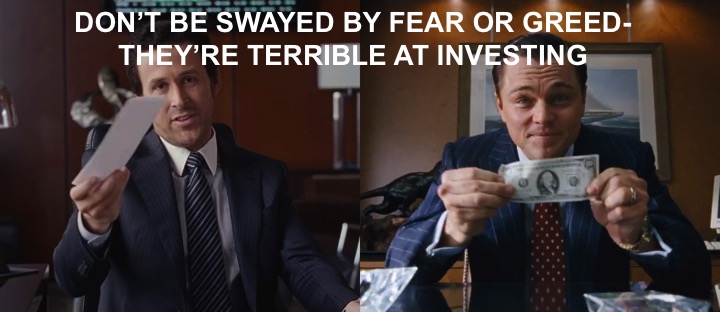This week I read a fascinating article about fear and greed in the stock market. This was the sub-heading-
“Political uncertainty is making investors nervous, but the best returns flow to those who stay in the market even if times are turbulent”
In reading this article there were several observations from the stock market that carry over to the property market, and that’s what I wanted to share.
One of the key messages from the article was the fact that in amongst this massively uncertain political backdrop, investors are having to live with sharp fluctuations in fund and share prices.
(I’ve personally experienced this with my own share portfolio seeing a 29% drop and a 20% recovery between Sep to Jan). The annoying thing about it is that these sharp movements often have nothing to do with the underlying assets or businesses, and everything to do with political events and speculation.
The market volatility plays havoc for anyone with a strategy to buy at the bottom and sell at the top. (Does this sound familiar for anyone trying to get the timing exactly right to buy a property investment? It can lead to waiting, and waiting and never actually buying something that could have been making money through rental income that whole time.)
The article went on to highlight the major point that history can help serious savers and investors build a fund to pay for the final decades of their lives, or indeed any other financial objective that is 5+ years out.
LESSON #1: HOW TO COPE WITH MARKET TIMING
The past few decades have demonstrated that the best way for investors to cope with the impossibility of market timing is to ignore it. That was the conclusion of a comprehensive analysis of stock market returns over the past 30 years by one of the world’s biggest fund management groups.
Relating that to property, I wouldn’t want anyone to misinterpret the lesson as don’t buy anything for a whole year or more because prices look toppy. Rather it’s a case of stacking the deck in your favour with proper due diligence and being clear on how you add value and create multiple exits to monetise the asset both now and in the long term.
I probably don’t need to remind anyone of the overused quote – ‘when is the best time to plant a tree?….”
The study by Fidelity found that if you invested £1000 in the FTSE All Share index in 1989, it would be worth £11,775 today.
By contrast, had you attempted market timing in buying and selling shares, but missed the best 30 days during these three decades, the total return would only be £2,838.
LESSON #2: IGNORE FEAR AND GREED
One of the Directors at Fidelity, the fund manager said, “To succeed at investment, we need to ignore fear and greed. Trying to time the market is a fool’s errand, especially when history shows that the best and worst days often tend to be bunched together during times of volatility”
OK, so we don’t have the same kind of up and down spikes within the very short periods in property but the message to heed is not getting caught up in a similar fear and greed sentiment.
LESSON #3: TIME IN THE MARKET
The answer to avoid the stresses of short term fluctuations is to remain fully invested over what you see as your investing lifetime. For many that will be multiple decades. ‘Time in the market is a simpler and surer way to build capital than trying to time the market perfectly.’
Again, these are broad principles we can borrow, rather than a hard rule, but these principles hold a lot of value in the world of property. Yes there will be times you can capitalise on a hot market to sell and release capital. However, if buying to sell, rather than hoping that a rising market will create your desired profit, I would rather advocate forcing your increased value by what you add to the property, or by the business you run through it.
Here are some hard facts to back the long game in property:
UK property values have grown on average 10% a year since the first records began in 1086 with the Domesday Book.
-The average UK property price in Q1 2009 was £149,709*
-The average UK property value in Q2 2018 was £226,906* (source: UK House Price Index gov.uk
So, even though the last 9 years haven’t performed at 10% a year, it still represents a 5.7% a year average growth (a return well above saving rates).
The lessons borrowed from the stock market world hopefully serve as validation for those already investing in property for the long term, and provide sound pros for those just getting started.
With just over a decade into my own property investing journey I fully intend to be in it for many more.
Here’s a classic quote to close on:
“Don’t wait to buy real estate. Buy real estate and wait.” – Will Rogers, actor
Do share your thoughts on property investing during uncertain times.
[Article source: Sunday Times Business Supplement]
P.S. If you’re looking to take your property investing to the next level, I can highly recommend getting yourself to the next Touchstone Six Figure Summit. Book your free seat here https://goo.gl/6QQ1s4

